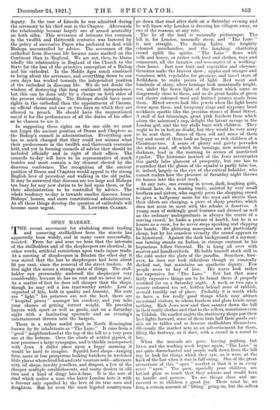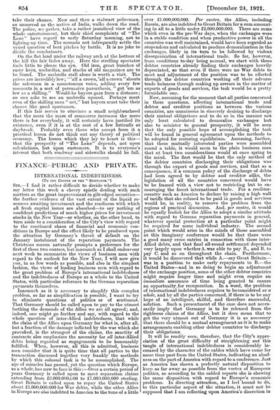OPEN MARKET. T HE recent movement for abolishing street trading and
removing stallholders from the streets has apparently been widely, and in many cases successfully, resisted. From far and near we hear that the interests of the stallholders and of the shopkeepers are identical; in other words, artificial restrictions upon trade injure trade. At a meeting of shopkeepers in Brixton the other day it was stated that the loss to shopkeepers had been about 50 per cent. since the removal of the street traders. At first sight this seems a strange state of things. The stall- holder can presumably undersell the shopkeeper very considerably, because he has no rent and no rates to pay. As a matter of fact he does sell cheaper than the shops, though he may sell a less trustworthy article. Less is expected of him, both in quality and honesty. His nuts are " light," his potatoes are not the best, there are " hospital pieces " amongst his crockery, and you take your chance of getting correct weight. He provides buyers with sport as well as goods, and on a Saturday night with a fascinating spectacle and an evening's entertainment thrown into the bargain.
There is a rather sordid road in North Kensington known by its inhabitants as " The Lane." It runs from a "good" neighbourhood at the top of the hill to a very poor one at the bottom. Once the abode of settled gipsies, it now possesses a large synagogue, and is thickly interspersed with Jews. A duller place upon a foggy morning it would be hard to imagine. Squalid food shops—ranging from more or less prosperous looking butchers to wretched little places where fried fish and cats' meat are sold—alternate with oil shops, tawdry jewellers, and drapers, a few of the cheaper multiple establishments, and many dealers in old iron and a kind of dingy brit-i-brac. It is the sort of road which makes a man who hates London hate it with a fervour only equalled by the love of its true sons and daughters. But let even the most bigoted countryman go down that road after dark on a Saturday evening and he will know why London is drawing his villagers away, or one of the reasons, at any rate.
The lie of the land is unusually picturesque. The hill is, for London, unusually steep, and " The Lane " is not straight. The flaring lights, the brightly coloured merchandise, and the laughing, chattering crowd uplift the spirits. " The Lane " flows with milk and honey, or rather with food and clothes, toys and ornaments, all the luxuries and necessaries of a working- class home. Just now fruit and vegetables and chrysan- themums make the bravest show ; apples and oranges and tomatoes, with vegetables for greenery, and tinsel stars of Bethlehem to make points of light. Red meat and hundreds of shiny, silver herrings look unnaturally bright, too, under the fierce light of the flares which come so dangerously close to them, and so do great hanks of green and cherry coloured wool and knitted jerseys made from them. Mixed sweets look like jewels when the light beats down upon them, and twopenny rings and sixpenny bead necklaces sparkle like the precidus stones of Bond Street. A stall of hat trimmings, great pink feathers from which adorn the salesman's cap, delight the latent savage in the London girl, and the toy stalls buzz with children. They ought to be in bed, no doubt, but they would be very sorry to be sent there. Some of them sell and some of them buy and most of them look as happy as rich children at a Christmas-tree. A sense of plenty and gaiety pervades the whole road, off which the turnings, now screened in darkness, lead in the morning to scenes of unrelieved squalor. The histrionic instinct of the Jews accentuates this partly false glamour of prosperity, but one has to remember that the gloom of the squalor is partly false too, is, indeed, largely in the eye of the critical beholder, who cannot realize how the pleasure of Saturday night throws its beams into the next week.
At any rate, one evening in seven, dark, laughing girls, without hats, do a roaring trade, assisted by very small brothers and sisters, who eagerly press the shopping crowd to give a halfpenny more for the toys and sweets than their elders are charging, a piece of sharp practice which does not seem to meet with the rebuke it deserves. A young man of strikingly good features and dressed as well as the ordinary undergraduate is always the centre of a moving crowd; he looks a picture of health, but he is as hoarse as a crow, for he never stops speaking and clapping his hands. His glittering saucepans are not particularly cheap, but by his ceaseless vivacity the crowd appears to be hynotized. Against the dark background of a mysteri- ous turning stands an Indian, in strange contrast to his loquacious fellow Oriental. He is hung all over with scarves and handkerchiefs. He holds himself stock still in the cold under the glare of the paraffin. Somehow, how- ever, he does not look ridiculous though so comically decked out, but maintains an apathetic dignity. Few people seem to buy of him. His wares look rather too expensive for "The Lane." Not but that some fairly expensive things are to be found there if properly searched for on a Saturday night. A week or two ago a canary coloured tea set, hidden behind rows of rubbish, seemed terribly out of place. Probably it is worth while to have a few really good things which may attract occasional visitors, to whom feathers and glass beads mean nothing. Rich Jews now and then saunter down the hill in their costly clothes and chat to the sellers, sometimes even in Yiddish. On market nights the stationery shops put their best lights forward, sonic of them turn half their goods out- side on to tables and so become stallholders themselves. Obviously the market acts as an advertisement for them, filling the footway, as it does, with a crowd in a mood to buy. When the nomads are gone, leaving nothing but litter, and the working week begins again, "The Lane" is not quite disenchanted and people walk down from the hill top to look for things which they saw, as it were, at the back of the fair when it was in full swing. One of the great attractions of this " open " market is that it is in every sense " open." The poor, specially poor children, see behind glass so much that they admire and would love to handle and possess. To see things close and un- covered is to children a great joy. There must be, we fear, a certain amount of "lifting" going on, but the sellers take their chance. Now and then a stalwart policeman; as unmoved as the native of India, walks down the road. The police, we gather, take a rather jaundiced view of the whole entertainment, but their chief complaints of "The Lane" have regard to early Saturday morning, not to lighting-up time. The nomads not infrequently settle the vexed question of best pitches by battle. It is no joke to divide the combatants.
On the flat land under the railway arch at the bottom of the hill the fair fades away. Here the strolling spectator finds little to please the eye. Old iron, great bunches of rusty keys, umbrellas, and stacks of old magazines are to be found. The umbrella stall alone is worth a visit. The prices are incredibly low; "'aff a crown, 'alf a crown " shouts the salesman in a monotonous voice, adding every few moments in a sort of persuasive parenthesis, " got 'em as low as a shilling." Would-be buyers gaze from a distance; no one asks to see an umbrella opened. Perhaps most even of the shilling ones " act," but buyers must take their chance like good sportsmen.
If this fair serves to convince a small neighbourhood that the more the mass of commerce increases the more there is for everybody, it will certainly have justified its existence, even if it is at the cost of a few fisticuffs at daybreak. Probably even those who accept from it a practical lesson do not think out any theory of political economy. The lesson which they lay to heart is this— that the prosperity of " The Lane" depends, not upon calculations, but upon customers. It is to everyone's interest that both roadway and sidewalks should be full.



































 Previous page
Previous page